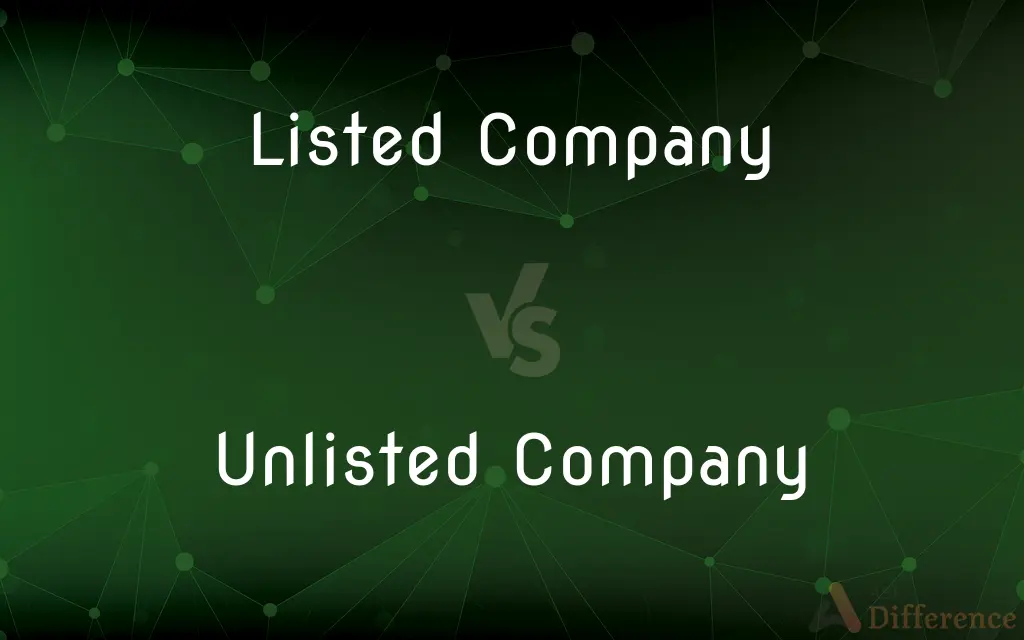Listed Company vs. Unlisted Company — What's the Difference?
By Tayyaba Rehman — Published on October 12, 2023
A Listed Company has its shares traded on a stock exchange, while an Unlisted Company does not have its shares publicly traded.

Difference Between Listed Company and Unlisted Company
Table of Contents
ADVERTISEMENT
Key Differences
A Listed Company has undergone the rigorous process to meet criteria set by stock exchanges, allowing its shares to be bought and sold by the public. Conversely, an Unlisted Company operates without such public scrutiny or adherence to those particular criteria.
With a Listed Company, its financial and operational activities are typically more transparent due to stringent regulatory requirements. On the other hand, an Unlisted Company might not be subjected to the same level of transparency, as it doesn't answer to public shareholders.
The shares of a Listed Company are easily transferable and can be traded freely in the stock market. In contrast, shares of an Unlisted Company don’t enjoy such fluidity, and their transfer often requires more internal processes.
Valuation of a Listed Company can be determined daily based on market performance. Whereas valuation of an Unlisted Company might not be as straightforward, often requiring more complex methodologies or internal evaluations.
Both Listed Company and Unlisted Company structures come with their own sets of advantages and challenges. While listed companies may access vast capital and have heightened credibility, they face more regulations. Unlisted companies, however, may enjoy more autonomy but might face challenges in raising capital.
ADVERTISEMENT
Comparison Chart
Public Trading
Shares publicly traded on stock exchanges
Shares not publicly traded
Regulation and Scrutiny
Subject to stringent stock exchange regulations
Fewer regulatory obligations
Transparency
High due to public trading and regulations
Might not have the same level of transparency
Share Transferability
Easily transferable and traded
Transfer can be more restrictive and internal
Valuation
Determined daily based on market performance
Requires complex methodologies or internal evaluations
Compare with Definitions
Listed Company
A business entity compliant with stringent stock exchange regulations.
Becoming a Listed Company allowed Tesla to raise significant capital.
Unlisted Company
A business not subjected to the regulatory requirements of stock exchanges.
The local family-owned bakery operates as an Unlisted Company.
Listed Company
An organization with transparent financial and operational activities for public scrutiny.
Being a Listed Company means Amazon's financials are publicly accessible.
Unlisted Company
A company with stock ownership often limited to a few stakeholders without public accessibility.
The family-owned winery has remained an Unlisted Company for generations.
Listed Company
A company whose stock value can be easily determined by market performance.
As a Listed Company, Microsoft's stock value fluctuates daily.
Unlisted Company
A firm without daily stock market valuation due to lack of public trading.
Many startups operate as Unlisted Companies in their early stages.
Listed Company
An entity that has undergone rigorous evaluation to be on a stock exchange.
After its IPO, Spotify became a Listed Company.
Unlisted Company
An entity that has chosen not to or hasn’t met the criteria to be publicly traded.
Some companies, valuing privacy and autonomy, prefer to remain Unlisted Companies.
Listed Company
A corporation whose shares are publicly traded on a stock exchange.
Apple is a Listed Company on the NASDAQ.
Unlisted Company
A company whose shares are not available for public trading on stock exchanges.
Ben & Jerry’s was an Unlisted Company before being acquired by Unilever.
Common Curiosities
Are the shares of an Unlisted Company available for public purchase?
No, shares of an Unlisted Company are not publicly traded on stock exchanges.
Does a Listed Company face more regulations than an Unlisted Company?
Yes, a Listed Company is subject to more stringent regulations due to its public trading.
What makes a company a Listed Company?
A Listed Company has its shares publicly traded on a recognized stock exchange.
Can an Unlisted Company decide to become a Listed Company?
Yes, through processes like an Initial Public Offering (IPO), an Unlisted Company can become listed.
Why might a company choose to remain an Unlisted Company?
An Unlisted Company might value its autonomy, privacy, or might not meet listing criteria.
Does being a Listed Company impact a company's credibility?
Often, being a Listed Company can enhance a company's credibility due to increased transparency.
Is it harder to sell shares of an Unlisted Company?
Generally, yes, as shares of an Unlisted Company lack the liquidity found on stock exchanges.
How often is a Listed Company required to disclose its financials?
A Listed Company typically has regular disclosure obligations, often quarterly and annually.
Are there fees associated with being a Listed Company?
Yes, Listed Companies typically incur listing fees and face ongoing costs related to compliance.
Can an individual invest in an Unlisted Company?
While possible, investing in an Unlisted Company often involves different processes and risks compared to public investments.
Share Your Discovery

Previous Comparison
Insulator vs. Non-Conductor
Next Comparison
CD vs. Vinyl RecordAuthor Spotlight
Written by
Tayyaba RehmanTayyaba Rehman is a distinguished writer, currently serving as a primary contributor to askdifference.com. As a researcher in semantics and etymology, Tayyaba's passion for the complexity of languages and their distinctions has found a perfect home on the platform. Tayyaba delves into the intricacies of language, distinguishing between commonly confused words and phrases, thereby providing clarity for readers worldwide.














































